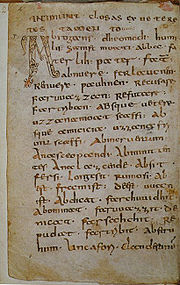
Abrogans
Encyclopedia

German language
German is a West Germanic language, related to and classified alongside English and Dutch. With an estimated 90 – 98 million native speakers, German is one of the world's major languages and is the most widely-spoken first language in the European Union....
. It is a manuscript dictionary of synonyms (or glossary, or word-list) from Latin
Latin
Latin is an Italic language originally spoken in Latium and Ancient Rome. It, along with most European languages, is a descendant of the ancient Proto-Indo-European language. Although it is considered a dead language, a number of scholars and members of the Christian clergy speak it fluently, and...
into Old High German
Old High German
The term Old High German refers to the earliest stage of the German language and it conventionally covers the period from around 500 to 1050. Coherent written texts do not appear until the second half of the 8th century, and some treat the period before 750 as 'prehistoric' and date the start of...
dating from the 8th century (765–775). Several copies were made, but only one has survived to the present, that in the library of St. Gallen
Abbey of St. Gall
The Abbey of Saint Gall is a religious complex in the city of St. Gallen in present-day Switzerland. The Carolingian-era Abbey has existed since 719 and became an independent principality during the 13th century, and was for many centuries one of the chief Benedictine abbeys in Europe. It was...
.
It is named after the first entry: abrogans = dheomodi (Modern German: demütig = modest, humble). It contains about 3,670 Old High German main terms, with about 14,600 examples. The work is sometimes attributed to the Austro-Bavarian prelate Arbeo of Freising
Arbeo of Freising
Arbeo of Freising was Bishop of Freising.He was a member of the Benedictine Order. At first a priest and notary under Bishop Joseph of Freising, he became in 763 abbot of the newly-founded monastery of Scharnitz...
(died 783 or 784), the first named German-language author.

